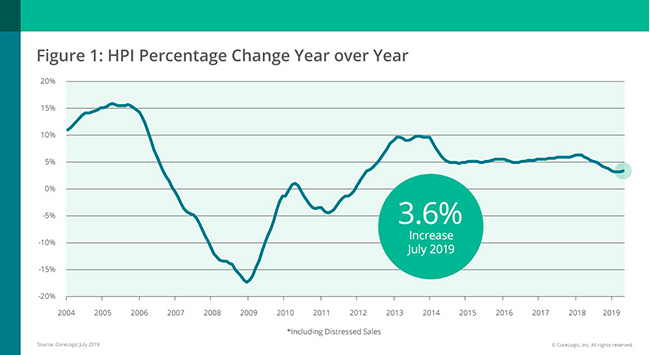In July, home prices climbed by 3.6% from the previous year, according to CoreLogic’s latest Home Price Forecast.
The CoreLogic HPI projects future home price growth based on several economic variables and measures the number of owner-occupied households in each state.
According to CoreLogic’s data, home prices increased by 0.5% from June and are now projected to increase by 5.4% come July 2020.
The image below highlights CoreLogic's annual HPI percentages:
(Click to enlarge; image courtesy of CoreLogic)
“Sales of new and existing homes this July were up from a year ago, supported by low mortgage rates and rising family income,” said Dr. Frank Nothaft, chief economist at CoreLogic. “With the for-sale inventory remaining low in many markets, the pick-up in buying has nudged price growth up.”
Nothaft said if these trends continue, CoreLogic expects home-price growth to strengthen over the coming year.
CoreLogic’s recent MCI report, which details the housing values in America’s 100 largest housing markets, revealed that 37% of the nation’s metropolitan areas had an overvalued housing market as of July.
Additionally, as of June, the company stated that 23% of the country’s top 100 metropolitan areas were undervalued, and 40% were at market value.
The MCI categorizes home prices in individual markets as undervalued, at value or overvalued, by comparing home prices to their long-run, sustainable levels, which are supported by local market fundamentals such as disposable income and more, according to CoreLogic.
Frank Martell, the president and CEO of CoreLogic said although the rise in home prices has slowed over the past several months, the company sees a re-acceleration over the next year to just over 5% on an annualized basis.
“Lower rates are certainly making it more affordable to buy homes and millennial buyers are entering the market with increasing force,” Martell said. “These positive demand drivers, which are occurring against a backdrop of persistent shortages in housing stock, are the major drivers for higher home prices, which will likely continue to rise for the foreseeable future.”
NOTE: The CoreLogic HPI is based on public record, servicing and securities real-estate databases and incorporates more than 40 years of repeat-sales transactions for analyzing home price trends.






